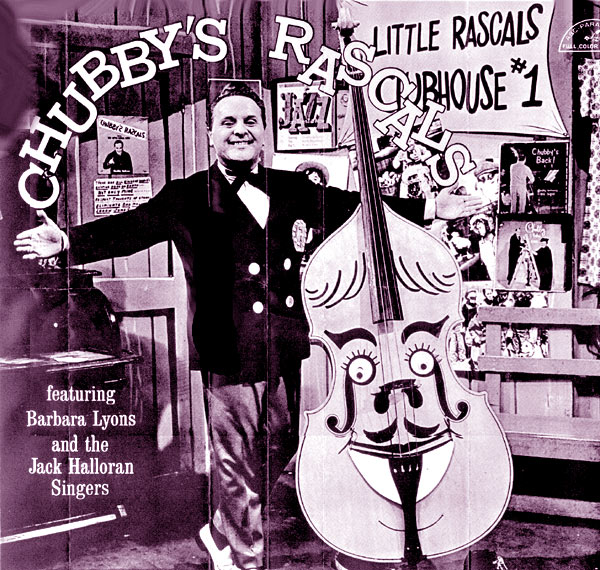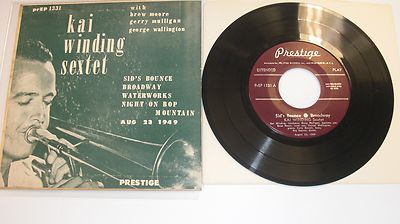For some of the key members of the Birth of the Cool nonet, it seems to have meant taking a step backward, and that's not meant as a criticism.
An important part of the impetus to forming the nonet was a dissatisfaction, especially on the part of Gil Evans and Gerry Mulligan, to the overemphasis on the flamboyant virtuoso soloist that was bebop. They came from big bands, particularly the Claude Thornhill band, which played dance music but encouraged some experimentation, and brought from some important jazz musicians...and arrangers.
And in fact the Miles Davis nonet, in its historic Royal Roost engagement, included its arrangers on the marquee -- Gil Evans, Gerry Mulligan, John Lewis. Mulligan and Lewis were also featured musicians, but giving marquee prominence to Evans may have been a first -- and was certainly deserved.
So what do you do? Lewis would move in a new direction with the Modern Jazz Quartet, but not for a couple of years. During this period, he continued to work as a sideman with boppers. Davis was to retrench, sort of, in his Prestige and Columbia albums of the 50s, playing bebop with a difference, creating the style called hard bop that became the most significant jazz style of the 50s. Konitz stayed out in left field, but then he really had no mainstream to go back to -- he'd come from left field, with Tristano.
Mulligan, in this session for Prestige, goes a certain way toward the bebop mainstream -- there are some powerful improvisatory and virtuoso solos -- but his retrenchment is more in a Thornhill direction, with some big band arrangements and full sound that touches back to swing in the way Thornhill and Herman did, while still staying decidedly modern.
Mulligan's New Stars didn't quite manage to become stars. Allan Eager and George Wallington are the only two whose names have remained with some resonance in jazz history.
I found this mention of two of Mulligan's men in an online essay called "Names of the Forgotten":
Where are Jerry' Lloyd, George Syran, and Phil Raphael and Phil Leshin? Jerry Lloyd was around in the 1940s and 1950s and recorded with Gerry Mulligan, Zoot Sims, and George Wallington, though he never became well-known and worked as a cab-driver even when he was featured on records with such artists... [Phil Leshin] worked with Red Rodney in 1951, but what else?
Nick Travis, according to this essay, played on 350 jazz recording sessions, so if he never quite broke through to serious name recognition, he clearly made a name as a guy you could count on. Here's Hal McKusick on Travis:
"Nick was a great player and a great guy. He was so busy in the 1950s. He'd get done with work at 2 a.m., head off to his home in New Jersey and be back the next day in a New York studio at 8 a.m. Zoot told me a funny story. Nick was so tired one day that he slept in. His phone rang early that morning. Nick sleepily answered: "Hello?" "Hi Nick, it's Zoot." Nick paused and said, groggily, "Zoot who?"
"I remember Nick as being quiet and intelligent. He spent a lot of time with his instrument. When you’re working the way we did, you didn't have a lot of time to practice, so work was practice. He was a great lead horn player and quite a soloist. Nick was always there on a date in every way. Efficient, on time and he never hit a bad note.
"Ultimately, Nick probably had too much work. We all did. Nick was in such great demand by so many different orchestrators and contractors at the time that he probably had a hard time handling the stress internally. He kept a lot of it bottled up, I guess. I didn't realize he had passed from ulcer troubles.
"As sounds go, Nick's was down the middle. You'd hear his horn and if you didn't know who was playing you'd say, 'Wow, who is that? That sure sounds good.' He caught your attention. Nick also was a wonderful reader, which was why he was in such demand. Nick played caringly."
There's less on Ollie Wilson and Mac McElroy. Wilson was in Woody Herman's Second Herd, and highly regarded. Mulligan used McElroy on at least one other recording.
I found this on Gail Madden, from a reminiscence by Bill Crow in a book called Fifties Jazz Talk: An Oral Retrospective by Jack Gordon.
I began by asking him if he knew a lady named Gail Madden, who had been a pianist and a model in California before becoming active in New York jazz circles in the early fifties. She appeared on Mulligan’s first album as a leader in September 1951, playing maracas on some numbers, and Gerry has credited her with suggesting the idea of a pianoless rhythm section to him before they left New York for California later that year. When they arrived in Los Angeles, it was thanks to Gail and her previous relationship with Bob Graettinger that Mulligan was introduced to Stan Kenton, who very soon bought some of Gerry’s arrangements. She also suggested hiring Chico Hamilton for Mulligan’s first quartet, so Gail Madden was clearly a significant, if unseen, influence on his early career.
"I met Gail before I knew Gerry very well, thanks to a drummer friend of mine by the name of Buzzy Bridgford. He introduced us at an apartment in Greenwich Village owned by a lady named Margo, who was apparently a $100 a night hooker and was bankrolling Gail, who wanted to be a therapist and save all the junky jazz musicians in New York. Charlie Parker had agreed to go along with all this and was first on her list. Gail’s plan was that, with Margo’s money, she would buy a brownstone and start a clinic and all the guys would come and live there so she could straighten them out and get them off junk. Buzzy, who knew all the inside jazz gossip, claimed that Joe Albany, Serge Chaloff, J. J. Johnson, Stan Levey, and Gerry were also going to be involved, but unfortunately for Gail, she had an argument with Margo over money and the whole idea collapsed. Soon after, she and Gerry became a “couple,” so we figured that if she couldn’t save everyone on her list, she would concentrate on him. She started turning up on his gigs out at Queens, playing maracas, and I remember her being there when Gerry was rehearsing a band in Central Park on the shore of the 72nd Street lake. Around that time they both disappeared from the New York scene, and the next thing we heard was that they were on the road, hitching to California, and we all laughed because that was exactly the sort of wild thing they would do. They made it, all right, and then those wonderful records that Gerry made with Chet Baker started coming out."
So this was Mulligan's first session as a leader. One other interesting thing about this recording
session, The first six songs are standard song length, about three minutes, and all of them were released on 78 and 45 -- "Mullenium" is pushing it at 4:05, but they managed to get it onto one side of a single. "Mulligan's Too" is over 17 and a half minutes long -- who recorded anything that long in those days? And it's Mulligan's first session as a leader, but he was able to talk Weinstock into it. It became a 10-inch LP, which you can now buy on eBay for $250.







 Ben Webster
Ben Webster James Moody
James Moody Gerry Mulligan
Gerry Mulligan